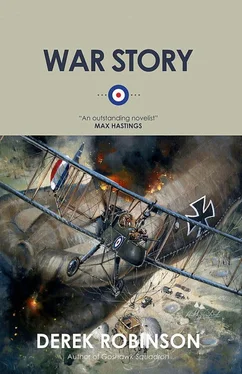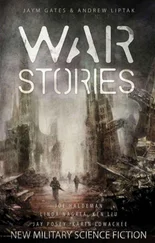O’Neill and Paxton were one of the last crews to take off. Everywhere they went they found German aeroplanes high above, willing to fight. The fight was always short: the Hun dived, fired, and kept going. O’Neill always turned to face the attacker and twice he held the FE rock-solid while Paxton did the shooting. Other times he kicked the rudder across as hard as he could when the enemy gunfire began pecking at their wings. As soon as he levelled out, Paxton would jump up and stand on his seat, eager to shoot down the Hun he thought was following them. O’Neill swore, and punched his legs to get him down. Until he came down O’Neill couldn’t manoeuvre. Usually Paxton got down quickly, but on one occasion he kicked at O’Neill to stop him punching. O’Neill, totally blind to what was happening behind, could only wait. And worry.
Paxton hung onto the Lewis with his right hand and stooped until their heads were close together. “When I do this,” he shouted, and waggled his left hand,”climb!” He straightened before O’Neill could answer.
The FE flew on. Clouds steadily readjusted their positions. O’Neill studied the view between Paxton’s legs and hoped that he was not wandering into an area lousy with Huns. Paxton opened fire, a series of short bursts and then a long one, sounding to O’Neill exactly like a small boy trailing a stick along some railings. Paxton’s left hand waggled vigorously. O’Neill climbed, shouting “I hope you sodding well know…” Paxton fired, a very long burst that emptied the drum. He jumped down, thoroughly delighted with himself, and leaned over the pilot’s windscreen. “Got him!” he shouted. He tugged O’Neill’s nose. O’Neill lashed out with his fist and knocked’Paxton into his cockpit. The Hun, when O’Neill found it, was so far below them that it almost blurred with the landscape. He knew it was there because it had left a long smear of smoke. Which could mean something, or nothing.
Drill was just drill to the Royal Flying Corps: a means of moving groups of men from here to there without losing any of them. To the battalion in camp behind Pepriac church, drill was an expression of the soul of the regiment. When invited to send a company to march up and down on part of the aerodrome, they put on a display of drill so crisp and confident that in the end all the squadron came out to watch. The troops were Yorkshiremen, and somewhere the company commander had found enough white roses for each man to wear one in his cap.
Cleve-Cutler, Dando and Brazier stood together, watching an about-turn on the march which flattened a dozen small molehills. “Makes you feel proud, doesn’t it?” Brazier said.
“Personally, no,” Dando said. “There are twenty-six bones in the human foot, including the ankle, and why the British Army has to perform its drill in a manner calculated to dislocate the lot of them, I can’t imagine.”
“Prussians are worse,” Brazier said. “Reinforced concrete parade grounds’ in Prussia.”
“These men seem to enjoy it,” Cleve-Cutler said. “Just look at them. Proud as peacocks.”
“I don’t have your intimate knowledge of the human foot,” Brazier said,”but I think I can safely tell you that our troops will march across No-Man’s-Land with their heads high, and in line abreast. So this is very good training.”
“You’re talking about after the victory.”
The adjutant shook his head.
“Well, come on, adj, tell us the secret,” Dando said. “I thought No-Man’s-Land was where you held your head high and Jerry blew it off.”
“Jerry won’t be there. This bombardment will continue for the rest of the week.”
“All week?” Cleve-Cutler said. “You mean non-stop, day and night? It’s not possible. Have we really got the shells?”
“Wait and see. When our men go over the top, there won’t be a German soldier left alive in their first-line trenches. We shall simply walk forward and occupy them. I have this on good authority.” Brazier stuck an empty pipe in his mouth as if to signify that that ended the matter.
The infantry halted, right-turned, presented arms. Dando thought about asking the adjutant if this too was in practice for crossing No-Man’s-Land but decided against it.
“By the way, I had a word with Frank Foster,” the CO told Dando. “He said he thinks you’re dotty.”
“Yes, I know. He came and apologised for that. He was very calm and civilised about it. Apparently he’s been under a lot of strain concerning a personal matter.”
“Family problems?”
“I’m not sure I ought to discuss it.”
“If he’s told you, he’s told half the squadron,” Brazier said. “It’s about his lady-friend in England, isn’t it?”
“Yes. It seems someone wrote and told him she had died, rather violently. That’s why he got so upset. Now he’s heard it was all a mistake, she’s really alive and well.”
“Good,” said Cleve-Cutler. “So that’s all right.”
Dando grunted. “I hope so. He certainly tried hard enough to make me think so.”
“If you’re worried about Foster’s state of mind,” the adjutant said,”you could always send him to see a doctor called Jackson. That’s who my general sent me to see after I shot young Ashby. Jackson’s the Army’s top man on heads, I understand.”
“How did you get on with him?”
“Useless. The man’s mentally defective.”
“As a matter of interest,” Dando said,”how could you tell?”
“Simple. He wanted to talk about panic. How could one recognise panic? So I picked up the poker and chased him round his desk for a couple of minutes. He knew all about panic. Didn’t thank me for it, though. Got very angry, screamed, made no sense. Touch of insanity somewhere in the family, I shouldn’t wonder.”
“Forget Jackson,” Cleve-Cutler told Dando.
“And forget Foster?”
“He’s happy flying and killing Huns. And besides, I’m not about to go looking for a new flight commander just when the Big Push is starting.”
O’Neill and Paxton returned from patrol as the drill display was ending. Paxton walked over in his flying gear to thank the captain commanding the company and to offer him a drink. “Did you have any luck up there?” the captain asked.
“I think we may have winged an Albatros. Mind you, that sort of thing cuts both ways.” He showed him the flapping heel on his flying boot.
“My stars! That was close.”
“Rotten shot. The Huns can’t shoot for toffee.”
The captain asked him what the bombardment looked like. “Oh, wonderful,” Paxton said. “Finest thing you every saw. Master Fritz has got a nasty headache, if he’s still alive. Frankly, I don’t see how he can be. I mean, nothing’s left. You can tell your chaps they’ll have a walkover.”
The troops were given a good meal and a bottle of beer each, and were then marched back to camp.
Only a few crews were flying after lunch. Some officers were at the pool; some sat in deckchairs and watched Corporal Lacey supervise the putting-up of the tennis nets. Nobody noticed the rumble of the barrage any more. It was like living near a waterfall.
Stubbs was reading a letter. “Holy cow!” he said. “My kid sister’s gone and got married.”
Charlie Essex yawned. “Pregnant, I assume,” he said.
Stubbs read on. “Yes, as a matter of fact, she was.”
Essex woke up with a start. “Oh, I say, old chap…” he had gone red in the face, as if someone had slapped him. “Please forgive me. I’m most frightfully sorry.”
“Forget it.” Stubbs turned a page. “Uncle Henry’s farm is doing well. Crop prices are up. He hopes the war goes on for ever.”
“He’s in for a rapid disappointment,” Paxton declared.
Читать дальше












